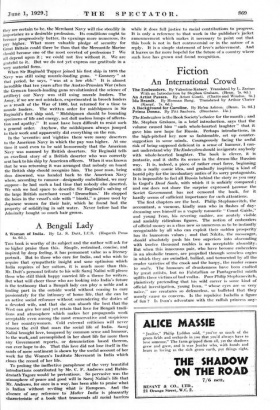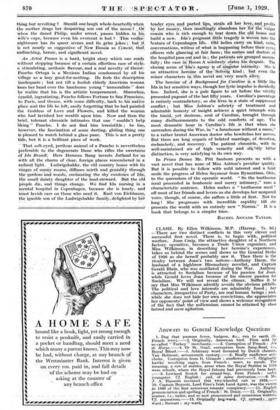Fiction An International Crowd
The Embezzlers. By Valentine Kataev. Translated by L. Zarinco (Knopf. 7s. 6d.)
The Einbezzkrs is the Book Society's choice for the month ; and Mr. Stephen Graham, in a brief introduction, says that the volume caused him "such whole-hearted laughter" that it gave him new hope for Russia. Perhaps introductions, in the high-pitched key now so fashionable, set up counter- suggestion in some minds. Courageously facing the awful risk of being supposed deficient in a sense of humour, I can- not understand why TheErnbezziersshould invigorate anybody with whole-hearted laughter. The book is clever, it is
fantastic, and it shifts its scenes in the dream-like Russian way. It is, indeed, a piece of rather cruel farce, beginning with a really comic idea, and gradually inspiring a kind of
horrid pity for the involuntary antics of its sorry protagonists. It is impossible to feel all Russia behind the story as you may in Gogol's Dead Souls, with which it is unfairly compared ; and one does not share the surprise expressed because the
Soviet Government has not censored the book, for it hardly seems of sufficient importance for such attentions.
The first chapters are the best. Philip Stephanovitch, the accountant, a vacuous, kindly man who in flashes of day- dreaming sees himself as a vaguely romantic "Count Guido," and young Ivan, his revering cashier, are acutely visible and amiably ridiculous figures. The notion of embezzlers of official money as a class now go numerous as to be instantly recognizable by all who can exploit their sudden prosperity has its humorous values ; and that Nikita, the messenger, should absolutely push his two superiors into absconding with twelve thousand roubles is an acceptable absurdity. But when this innocuous pair, who have become embezzlers in an alcoholic trance, are propelled through senseless orgies in which they are swindled, bullied, and tormented by all the cruder varieties of the crook and the harpy, the reader ceases to smi/e. The humours of drunkenness have been exalted by great artists, but no Falstaffian or Pantagruelist mirth uplifts these victims of bad vodka. Poor Philip Stephanovitch, plaintively pretending that his wild career is some kind of official investigation, young Ivan, "whose eyes are so very naive," are creatures so defenceless, so buffeted that they merely cause us concern. Is the repulsive Isabella a figure of fun ? Is Ivan's adventure with the raffish princess any-
thing .but revolting ?- Should one laugh whole-heartedly when the Mother drags her despairing son out of the noose ? Or
_ . . . _ - when the dazed Philip, under arrest, passes hidden in his wife's cape, because even his overcoat is lost ? . This vodka: nightmare has its queer .scenes and its grim jokes ; but it •
is not nearly so suggestive of New Russia as Cement, that unflinching, heroic, and significant novel.
An Artist Passes is a hard, bright story which one reads
Without stopping because of a certain effortless ease of style, a stimulating, sardonic flavour, and a real novelty of theme. Pancho Ortega is a Mexican Indian condemned by all his !Wage as a lazy good-for-nothing. He feels the description inadequate; but not till a foolish elderly American woman loses her head oyer-the handsome young " hmnoraliste " dots he realize that his is the artistic temperament. Shameless,
t -
candid, ingratiating, Pancho follows Fortune to San Francisc:o, in Paris, and thence, with Some difficulty, back to his native place and the life he left; easily forgetting that he had painted the Goddess of Love and Flowers, and killed the woman Who had lavished her wealth upon him. Now and then the brief, tolerant chronicle intimates that one "couldn't help liking" Pancho. I do not find him irresistible ; he has, however, the fascination of some darting, gliding thing one is pleased to watch behind a glass pane. This is not a pretty tale, but it is a brilliant piece of work.
That soft-eyed, perilous animal of a Pancho is nevertheless
Preferable to the degenerate Dane who rifles the sweetness Of Ida Brandt. Here Herman Bang invests Jutland for us With all the charm of clear, foreign places remembered in a radiant light. LudWigsbakke, the old Country house with its ranges of sunny rooms, diffuses mirth and geniality through the gaidens and woods, enchanting the ski existence of Ida; the small dainty daughter of the land-steward. But the Old People die, and things change. We find Ida nursing in a 'Mental hospital in Copenhagen, because she is lonely, and !Trust lavish care on those who need it. Karl von Eichbaum; the ignoble son of the Ludwigsbakke family, delighted by her tender eyes and parted lips, steals all her love, andinoms by her money, then insultingly abandons her for-ifie .irulgar cousin who is rich enough to tear down the old house and build a new. Ida's poignant little tragedy is woven into the texture of Copenhagen life. Old ladies carry on kind, calm, conversations, witless of -what is happening before their eyes; officers ride glancing at fair faces ; the nurses and doctors of the hospital pass out and in ;_ the patients are grouped mourn- fully ; the case Room A soinbrely states his despair. The closing scene of ;Ida's agony is of 'singular intensity. She is an attractive -heroine of tpe::Solveig, kind ; but even the minor characters in:this novel are very much alive.
The heroine of A Background for Caroline i a little like Ida in her sensitive ways, though her jyric impulse is decidedly less. Indeed, she is a pale figure to set before the vividly presented pageant of the last fifty years. Caroline's parentage is entirely contradictory, so she lives in a state of suppressed conflict ; but Miss Ashton's sobriety of treatment and admirable honesty of insight achieye a quiet triumph with the timid, yet desirous, soul of Caroline, brought through many disillusionments to the odd comforts of age. The most dramatic hour in Caroline's life LS that when she surrenders during the War, in "a farmhouse without a name," to a rather brutal American doctor who bewitches her nerves. But there are long sequels of belated marriage, of devotion, Melancholy, and recovery. The patient chronicle, with its well-maintained air of high veracity and slightly bitter distinction, is very satisfying in its own way.
In Prima Donna Mr. Pitt Sanborn presents us with a vast novel that has none of Miss Ashton's peculiar quality. But it is possible to follow with mild interest and a faint smile the progress of Helen Seymour from Byzantium, Ohio, to the queendom of the operatic world. "So the toothsome Meal proceeded in bonhomie and merry intimacy," runs a characteristic sentence. Helen makes a "toothsome meal" off most of her friends and lovers as she develops her nonpareil voice, though, of course, she suffers a little at first. Not for long ! She progresses with incredible rapidity till she presents the world with an entirely new "Norma." It is a book that belongs to a simpler time.
RACIIEL ANNAND TAYLOR.











































 Previous page
Previous page